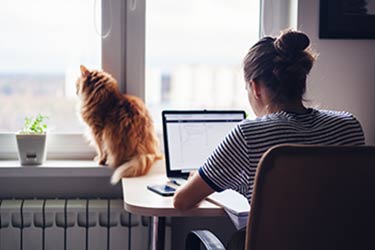Helping Your Pet Cope with Change

Helping Your Pets Cope with Change
From stay-at-home orders and virtual learning to back to work, back to school, or somewhere in between, it’s no secret that the COVID-19 pandemic has uprooted our schedules, and, though we may not think about it, our pets’ schedules.
While quarantine brought extra time with our pets or even the opportunity to bring a new pet home, it also disrupted our pet’s routines.
Home is Where Your Pet Is
Even outside of the pandemic, kids heading back to school from summer break, starting a new job with new hours, or other life changes can bring a disruption to your pet’s routine. Your normally well-adjusted pal may start exhibiting new behaviors and signs of stress. We know how change can affect our well-being, so how do we help our pets adjust?
Typically, our pets are left alone in our homes during the day, and they are used to having some downtime to themselves. Then, suddenly, they had to share their normal peace and quiet with a cacophony of quarantined families. Your pet’s favorite sleep spot may have become your home office.
For those who introduced a new pet into their home, that pet adjusted to your home while you were there all the time, now that you’re spending time away from home, all they’ve known is being turned upside down.
Though pets can form strong bonds with humans, constant stimulation or a sudden change in routine can cause them to retreat from you. Now, many pets’ lives are now being disrupted again by their owners’ slow return to life outside the home. In some cases, this can lead to displacement behaviors — separation anxiety, aggression, whining, chewing, pacing, hissing, over-grooming, jumping or growling. In other cases, our newfound presence at home may reveal some bad behaviors your pets have already had but that you were able to miss or ignore while away.
Adjusting, and Readjusting, to Our New Normal
We want what’s best for our non-human friends. While we don’t always have a say in our routines, we can find ways to help our pets adjust alongside us.
If your family is going to start going back to work or school soon, the main thing you can do now is to help pets remember what it’s like to be left alone. Try taking a short walk or drive without them. Help them stay occupied by encouraging independent activities like a puzzle toy or special chew toy. If you can, invest in a pet camera to monitor them so that you know what’s going on when you’re not at home. Keeping an eye on them while you’re away can help ease your anxiety and identify any potential triggers for your pet — like reactivity to outside stimuli.
As you get your pet used to your comings and goings, make those activities low excitement. Pets are smart — if you make a big deal about leaving, they might, too. If they seem agitated when you put on your shoes because it means you will walk out the door soon, practice putting on shoes when you aren’t actually going to leave. Most of the time, simply easing your dog back into your routine can make a world of difference.
In more severe cases of separation anxiety where a pet is causing a lot of destruction or harming themselves, consider consulting your veterinarian about calming medication or supplements. In extreme cases, seek help from a certified trainer. Most separation anxiety cases can be controlled with a consistent behavior modification plan. If you think your pet may suffer from separation anxiety, the earlier you can start managing their anxiety before heading back to work, the earlier both you and your pup will benefit.
Looking Ahead
We can’t always predict when we’ll have a major life change that disrupts our routine. In any case of a change in your schedule, set your pet up for success by helping them transition.
If they have a set feeding or walking schedule, do your best to stick to that or slowly adjust it over time versus all at once. Even when you are home, encourage them to play independently. Make sure your pet gets enough exercise, both physically and mentally, to prevent them from feeling “pent up”. Consistency is key! By forming good behaviors, you set yourself and your pet up for success.
Covetrus North America is dedicated to the health of animals. Visit us online or contact your Covetrus representative at 855.724.3461.
Sources:
Need Regulatory Assistance
If you need help with regulatory or licensing issues, we're happy to help. We have a wide variety of resources to help you when issues arise.

Careers
Are you looking for a place to let your talents shine? At Covetrus, we help our practitioner customers better serve their patients and take pride in providing the best customer experience possible. Search our open positions to see our available opportunities.
Newsletter
Stay current with what’s going on with Covetrus, subscribe to receive our newsletter and email communications. Subscribers will receive the latest information in practice management, sales and marketing, animal health, and more.



Leave a comment